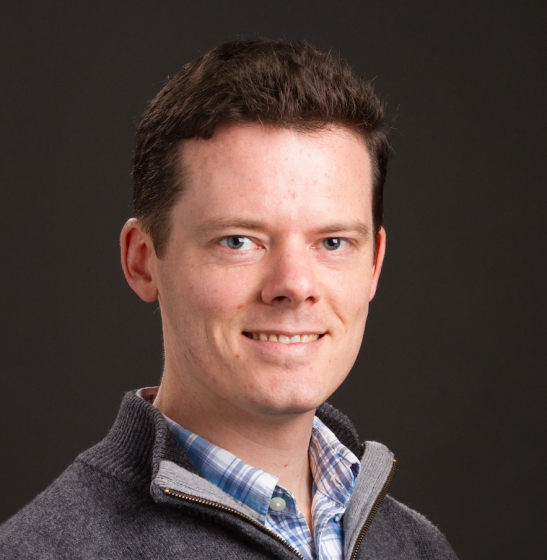Forrest Crawford, YINS Faculty Affiliate and YSPH Researcher, Receives National Award for Innovative, Creative Science
Forrest Crawford, YINS Faculty Affiliate and YSPH Researcher, Receives National Award for Innovative, Creative Science
A Yale School of Public Health researcher is one of the 2016 recipients of the NIH Director’s New Innovator Award. The prestigious award funds the work of investigators who are conducting highly creative, innovative research in the early stages of their careers.
Forrest W. Crawford, Ph.D., assistant professor of biostatistics and of ecology and evolutionary biology, was granted the award for his project, titled “Network-based epidemiology for hidden and hard-to-reach populations.” Through development of novel statistical and computational methods, Crawford aims to dramatically improve epidemiological surveillance for hidden and hard-to-reach populations.
The groups at highest risk for adverse epidemiological health outcomes, like HIV infection, can also be the most difficult for public health researchers to study. For example, groups that experience social stigma or discrimination, like injection drug users, sex workers and men who have sex with men, may fear exposure or persecution if they participate in a research study. This difficulty limits the capacity of public health researchers to collect accurate information about disease burden and risk factors in these groups. Lack of information about risk groups makes it difficult for policymakers to target public health interventions to the populations that most need them.
“This award will allow us to devote time and resources to solving one of the most difficult problems in public health and epidemiology,” said Crawford, who joined the school’s faculty in 2012 and is also a member of the Center for Interdisciplinary Research on AIDS (CIRA) at Yale.
Traditional methods for learning about the characteristics of a large population rely on random sampling from a list of all individuals who meet certain inclusion criteria. However, in epidemiological studies of hidden and hard-to-reach groups, no such list exists, and researchers must resort to methods that leverage the social structure of the target population to recruit subjects. In many studies, participants are asked to refer or recruit others who meet inclusion criteria to researchers. The most popular such social link-tracing method is called “respondent-driven sampling”, or RDS.
In his proposal, Crawford outlines a new method of analyzing data gathered through RDS, and also plans to create easy-to-use, open-source, web-based software that implements these methods. With these new tools, researchers will better able to collect accurate information about hidden, at-risk populations, and infer properties of social networks and estimate population characteristics in order to design better clinical studies, which could ultimately lead to better interventions in these challenging populations. His work also represents a unique opportunity to bridge the divide between the emerging field of network science and epidemiological surveillance for key populations.
This award will allow us to devote time and resources to solving one of the most difficult problems in public health and epidemiology”
FORREST W. CRAWFORD
The NIH Director’s New Innovator Award was created in 2007 to support young investigators conducting potentially paradigm-shifting work in their fields. Recipients are awarded $1.5M over five years. The New Innovator Award is part of the high-risk, high-reward program, whose aim is to “support scientists of exceptional creativity who propose highly innovative approaches to major contemporary challenges in biomedical research.”
“This is a fantastic honor and it reflects on the remarkable research that Forrest has done during a relatively short time at YSPH,” said Dean Paul Cleary. “This project is vitally important and it aligns closely with the mission of the school.”
At Yale, Crawford’s research group focuses on creating statistical, computational, and mathematical tools to solve the most pressing challenges in the field of public health, with a particular emphasis on statistical problems in epidemiology that are not solvable by standard methods. His experience in biology, epidemiology, medicine, public health, mathematics, and statistics has resulted in important contributions to innovative cross-disciplinary research in biology, medicine, and public health.
The challenges of RDS in reaching at-risk, hard-to-reach populations led him to examine the problems of the method. He has previously published on the nature of data collected by RDS, and has participated in a UNAIDS panel on population size estimation for key risk groups.
In addition to his work on disease rate estimation in hidden populations, Crawford focuses on statistical methods for learning from stochastic processes in genetics, evolution, epidemiology, neuroscience, and public health. His ongoing projects include studies of infectious disease dynamics, vaccine effects, network diffusion processes and molecular evolution. He received his Ph.D. from UCLA in 2012.
“Forrest is a rising star in statistics. His work is bringing modern statistical and computational approaches to addressing some of the most significant and challenging public health problems. We are very proud of his accomplishments and honored to have him as our colleague,” said Hongyu Zhao, chair of the Department of Biostatistics.
See the full list of recipients at commonfund.nih.gov/newinnovator/Recipients16.


